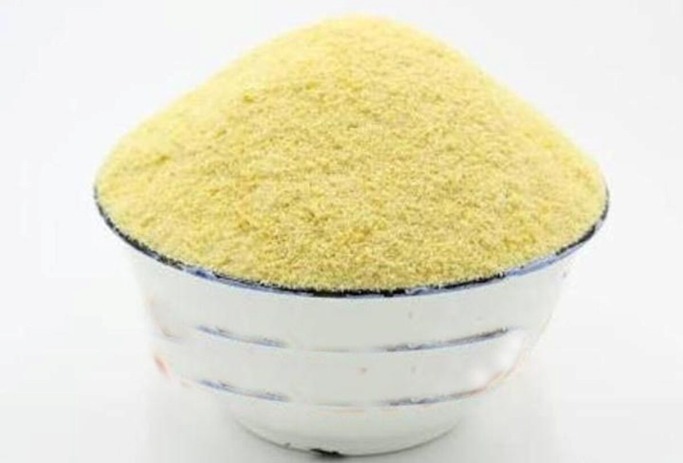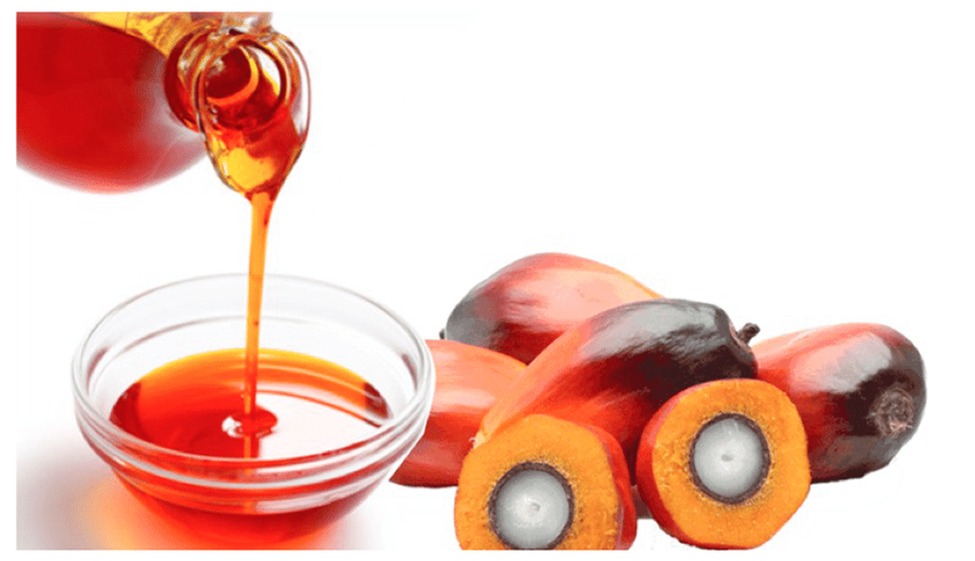‘Gari and beans’ lowers risk of belly fat, obesity

This article is a special request I received from some readers. This is a difficult article since meal preparation has many ingredients. However, I tried every possible means to research on this significant subject.
Let’s get started: Wikipedia(2021) notes that Gari and beans are very nutritious, gari is starch-rich and serves as a source of energy. In this article, I will focus on the scientific review of the four major ingredients used for gob3(Beans, Gari, fried Plantain, and Palm oil). The other ingredients are minor so I will not focus on them but they add up to the taste and holistic benefits.
Yoo ke garri, The Science
I examine yoo ke gari based on the four key ingredients as adumbrated:
Blacked eyed peas
Gari
Palm Oil
Fried Plantain
Beans

Gob3 is a Ghanaian staple food
Black-eyed peas are the beans used in gob3. There are other types of beans and they are nutritious.
Black-eyed peas, science
Weight loss
Black-eyed peas are loaded with protein and soluble fiber, this means eating gob3 or yoke gari supports weight loss. Two studies (Bloom et al.2006; Lomenick et al.2009 ) found that the Protein in gob3 reduces levels of ghrelin, a hormone that’s responsible for stimulating feelings of hunger.
On the other hand, as a soluble fiber, Lattimer and Haub’s (2010) study found that this fiber is a type of fiber that forms a gel-like consistency and goes into your digestive tract slowly to make you full. This account for why most people like eating gob3 to keep them for the day. Eating beans, therefore, helps to manage your weight.
For instance, one large study in 1,475 people, by Papanikolaou and Fulgoni(2008) found that people who ate beans frequently had a 23% lower risk of increased belly fat and a 22% lower risk of obesity, compared with non-consumers.
Another, Kim et al.(2016) review of 21 studies found that consuming black-eyed peas, in your diet(gob3) could be an effective weight loss strategy and may help reduce body fat percentage.
Digestive Health
As a soluble fiber food, black-eyed peas support digestive health. Interestingly, one meta-analysis by Yang et al.(2012) demonstrates that when we eat more gob3, the soluble fiber can help promote regularity and increase stool frequency in those with constipation.
Anderson et al.(2009) also found that the fiber in gob3 may avert digestive disorders, such as acid reflux, hemorrhoids, and stomach ulcers. Another good news is that one study by Carlson et al.(2019) found that the soluble fiber found in black-eyed peas and other plants can also act as a prebiotic, which helps the growth of the beneficial bacteria in our gut to help foster a healthy microbiome.
Kechagia et al.(2013) found that these beneficial bacteria go beyond our digestive health support but also reduce inflammation, enhance immune function, and reduce cholesterol levels.
Heart Health
Eating gob3 also reduces your risk of heart diseases. Bazzano et al.(2009) review of 10 studies, found that frequent eating of legumes was linked to lower levels of total and LDL (bad) cholesterol, these two could add to heart disease
Alizadeh et al.(2014) study on 42 women found that when we eat a low-calorie diet enriched with 1 cup of legumes per day for 6 weeks drastically decreased waist circumference and triglyceride and blood pressure levels, juxtaposed with a control group. Three studies(Esmaillzadeh and Azadbakht, 2012; Hosseinpour-Niazi et al. 2015; Golia et al. 2014) found that frequent consumption of legumes is linked to lower markers of inflammation, and therefore reduces your risk of heart disease
Gari, science

Gari makes a good choice for people with health conditions like diabetes, high blood pressure, or high cholesterol since it’s extremely low in salt/sodium, sugar, and fat, plus free from refined carbohydrates and synthetic ingredients.
Although it’s not very high in fiber, protein, healthy fats, or other essential nutrients (aside from vitamin C), cassava is low in calories and allows you to enjoy some of your favorite recipes without the use of processed, bleached, or gluten-containing flours.
Cassava gari, vitamin C, digestion, colon health
one study by Montagnac et al.(2009) found that cassava is loaded in vitamin C juxtaposed to other staple crops (and grains) and contains more vitamin C than potatoes, yams, wheat brown rice, corn, and plantains.
Two studies (Korczak et al. 2017; Rachman et al. 2020) found that cassava gari is rich in dietary fiber. Dietary fiber aids digestion, fecal frequency, and weight. It also reduces the colonic transit time of digested food.
Cassava gari is a resistant starch. Magallanes-Cruz et al.(2017) explained that resistant starch is starched that the small intestine does not digest. Nugent, (2005) explained that resistant starch work in a similar manner to dietary fiber. They pass from the small intestines into the colon where they begin to ferment and finally promote gut health by feeding the beneficial gut bacteria as they ferment(Maier et al.2017).
Palm Oil
Palm Oil, Scientific Benefits

Support Brain health, Heart Health
Palm oil is loaded with tocotrienols, a form of vitamin E which contains antioxidants that may support brain health. In the human study, Gopalan et al. (2014) conducted for 2-years involving 121 people with brain lesions, the group who took palm oil-derived tocotrienols twice a day remained stable, but for those who received a placebo, their lesions grow.
Though some study results have been mixed, this oil largely appears to have beneficial effects on heart disease risk factors, including lowering LDL (bad) cholesterol and increasing HDL (good) cholesterol (Fattore et al.2011; Ismail et al.2018; Lucci et al.2016; Voon et al. 2015)
In the case of Fattore et al.(2011), the study involved a large analysis of 51 studies and found that total and LDL (bad) cholesterol levels were lower in people who consumed palm oil-rich diets than those who consumed diets high in trans fats or myristic and lauric acids.
In a previous clinical trial, Zhang et al.(1997) also examined the effects of palm oil, soybean oil, peanut oil, and lard on cholesterol levels. The authors found that palm oil caused a 13.1 percent decrease in bad LDL cholesterol and a 6.7 percent drop in triglyceride levels in those with normal cholesterol. Apart from Palm oil lowering your cholesterol levels, it also slows the progression of heart diseases.
Enhanced vitamin A
One old study by McLaren(1999) and a recent review study by Tan et al.(2021)found that Red palm oil enhances vitamin A status in people who are deficient or at risk of deficiency because it’s rich in carotenoids that the body can convert into vitamin A.
Another small study in 16 participants by Sommerburg et al.(2015)found that people with cystic fibrosis, a condition that makes it difficult to absorb fat-soluble vitamins, experienced an increase in vitamin A blood levels after taking two to three tablespoons of red palm oil daily for 8 weeks.
A previous clinical trial by Radhika et al.(2013) also found that Palm oil is mostly used as a supplement to help improve vitamin A status in those who are at risk for deficiency. This study emanated from the National Institute of Nutrition, Indian Council of Medical Research in India, for example, showed that treating pregnant women with red palm oil increased vitamin A levels for both women and their babies.
Another meta-analysis of nine high-quality studies by Dong et al.(2017)found red palm oil supplementation to increase vitamin A levels in both children and adults.
Fried plantain

Mixed Study on Glycemic index in Plantain.
Ogbuji et al.(2013) found that the average glycemic index for ripe plantain is 54.6 and 45.3 for unripe plantain. They also noted that the glycemic index values for fried, boiled and roasted ripe plantain are 56,54 and 55 respectively.
one study by Kouamé et al.(2017) in Côte d’Ivoire found plantain chips to have a GI of 45 which is within the low range(refer to my previous article on GI). The study did not support consuming Banane braisée(Charcoal –roasted light green stage plantain) which has a GI of 89 and uses the roasting method. The other cooking method for plantain such as chips used deep frying with major ingredients being salt, and refined palm oil.
A previous study by Ayodele and Godwin(2010) in Nigeria found no difference between boiled plantain (Bp), fried plantain (Fp), roasted plantain (Rp), boiled and pounded plantain (BPp), and plantain flour. The study found that roasted plantain gave the lowest glycemic index and the value was significantly lower than the other test foods.
Plantain, Science
Loaded with Potassium, Magnesium
Plantain contains 913 milligrams of potassium in one cup of cooked, mashed plantains. This is about 27 percent of the recommended daily amount of potassium, this gives plantains an advantage over cassava and makes it one of the most potassium-rich foods on the earth.
He and MacGregor(2008) study found that potassium contents also affect skeletal and smooth muscle contraction, which allows for regular digestive and muscular function. Potassium in addition supports heart rhythm, and studies show that people who consume diets with high potassium levels have a reduced risk of stroke, osteoporosis, and kidney disease.
Magnesium contents control blood pressure and support osteoporosis and many others. Additionally, Paunier’s (1992) study found that magnesium directly affects calcium absorption, which can avert or reverse osteoporosis.
Digestive Health, Immunity
Vitamin C is an antioxidant that fights free radical damage. Studies revealed that plantains have over 35 percent of the daily value of vitamin C. This makes plantain one of the best vitamin C foods to eat. Also, Plantain is loaded with 36 percent of the daily value of vitamin A and helps the body. Vitamin A and C support the immune system and fight diseases.
Plantains also can give you 24 percent of your daily value of vitamin B6. This important vitamin supports the brain. This vitamin in plantains is one of the eight B vitamins that aid in processing food into energy and metabolizing fats. Similar to vitamin A, B6 also helps slow the onset of eye diseases like macular degeneration. B6 and B12 work together to manufacture red blood cells and cells in the immune system and also fight rheumatoid arthritis.
Warning
Messina, V(2014) found that black-eyed peas are likely to cause stomach pain, gas, and bloating in some people due to their content of raffinose, a type of fiber that can aid digestive matters. However, this could be addressed by soaking and cooking dried beans to enable easier digestion. Alternatively, one can use tablets and pills to deal with the gas.
On the other hand, Masum et al.(2011) found that Black-eyed peas also contain antinutrients, such as phytic acid, which bind to minerals like iron, zinc, magnesium, and calcium and prevent their absorption in the body. This, Gupta et al.(2015) found that it can however be averted by soaking and cooking black-eyed peas before eating to drastically reduce their phytic acid content and help boost nutrient absorption.
So in conclusion Black-eyed peas in gob3 may help increase weight loss, improve digestive health, and support better heart health. Also, the study on fried plantain is mixed on diabetics’ health. So I advise diabetics to eat gob3 moderately.
Take home
So this is what you get from eating gob3. I hope my review helps you. Always do remember that the starch content in cassava products is resistant starch and they are beneficial to our health especially gut health.
The writer is a Professor of Naturopathic Healthcare, President, Nyarkotey College of Holistic Medicine & Technology (NUCHMT)/African Naturopathic Foundation. E-mail: collegeofholisticmedicine@gmail.com.
References
- Borresen EC, Jenkins-Puccetti N, Schmitz K, Brown DG, Pollack A, Fairbanks A, Wdowik M, Rao S, Nelson TL, Luckasen G, Ryan EP. A Pilot Randomized Controlled Clinical Trial to Assess Tolerance and Efficacy of Navy Bean and Rice Bran Supplementation for Lowering Cholesterol in Children. Glob Pediatr Health. 2017 Feb 16;4:2333794X17694231. doi: 10.1177/2333794X17694231. PMID: 28345013; PMCID: PMC5349558.
- Luhovyy BL, Mollard RC, Panahi S, Nunez MF, Cho F, Anderson GH. Canned Navy Bean Consumption Reduces Metabolic Risk Factors Associated with Obesity. Can J Diet Pract Res. 2015 Mar;76(1):33-7. doi: 10.3148/cjdpr-2014-030. PMID: 26067245.
- Sombié PAED, Compaoré M, Coulibaly AY, Ouédraogo JT, Tignégré JS, Kiendrébéogo M. Antioxidant and Phytochemical Studies of 31 Cowpeas (Vigna unguiculata (Walp L)) Genotypes from Burkina. Foods. 2018 Sep 3;7(9):143. doi: 10.3390/foods7090143. PMID: 30177591; PMCID: PMC6165398.
- Blom WA, Lluch A, Stafleu A, Vinoy S, Holst JJ, Schaafsma G, Hendriks HF. Effect of a high-protein breakfast on the postprandial ghrelin response. Am J Clin Nutr. 2006 Feb;83(2):211-20. doi: 10.1093/ajcn/83.2.211. PMID: 16469977.
- Lomenick JP, Melguizo MS, Mitchell SL, Summar ML, Anderson JW. Effects of meals high in carbohydrate, protein, and fat on ghrelin and peptide YY secretion in prepubertal children. J Clin Endocrinol Metab. 2009 Nov;94(11):4463-71. doi: 10.1210/jc.2009-0949. Epub 2009 Oct 9. PMID: 19820013; PMCID: PMC2775646.
- Lattimer JM, Haub MD. Effects of dietary fiber and its components on metabolic health. Nutrients. 2010 Dec;2(12):1266-89. doi: 10.3390/nu2121266. Epub 2010 Dec 15. PMID: 22254008; PMCID: PMC3257631.
- Papanikolaou Y, Fulgoni VL 3rd. Bean consumption is associated with greater nutrient intake, reduced systolic blood pressure, lower body weight, and a smaller waist circumference in adults: results from the National Health and Nutrition Examination Survey 1999-2002. J Am Coll Nutr. 2008 Oct;27(5):569-76. doi: 10.1080/07315724.2008.10719740. PMID: 18845707.
- Kim SJ, de Souza RJ, Choo VL, Ha V, Cozma AI, Chiavaroli L, Mirrahimi A, Blanco Mejia S, Di Buono M, Bernstein AM, Leiter LA, Kris-Etherton PM, Vuksan V, Beyene J, Kendall CW, Jenkins DJ, Sievenpiper JL. Effects of dietary pulse consumption on body weight: a systematic review and meta-analysis of randomized controlled trials. Am J Clin Nutr. 2016 May;103(5):1213-23. doi: 10.3945/ajcn.115.124677. Epub 2016 Mar 30. PMID: 27030531.
- Yang J, Wang HP, Zhou L, Xu CF. Effect of dietary fiber on constipation: a meta analysis. World J Gastroenterol. 2012 Dec 28;18(48):7378-83. doi: 10.3748/wjg.v18.i48.7378. PMID: 23326148; PMCID: PMC3544045.
- Anderson JW, Baird P, Davis RH Jr, Ferreri S, Knudtson M, Koraym A, Waters V, Williams CL. Health benefits of dietary fiber. Nutr Rev. 2009 Apr;67(4):188-205. doi: 10.1111/j.1753-4887.2009.00189.x. PMID: 19335713.
- Carlson JL, Erickson JM, Lloyd BB, Slavin JL. Health Effects and Sources of Prebiotic Dietary Fiber. Curr Dev Nutr. 2018 Jan 29;2(3):nzy005. doi: 10.1093/cdn/nzy005. PMID: 30019028; PMCID: PMC6041804.
- Kechagia M, Basoulis D, Konstantopoulou S, Dimitriadi D, Gyftopoulou K, Skarmoutsou N, Fakiri EM. Health benefits of probiotics: a review. ISRN Nutr. 2013 Jan 2;2013:481651. doi: 10.5402/2013/481651. PMID: 24959545; PMCID: PMC4045285.
- Bazzano LA, Thompson AM, Tees MT, Nguyen CH, Winham DM. Non-soy legume consumption lowers cholesterol levels: a meta-analysis of randomized controlled trials. Nutr Metab Cardiovasc Dis. 2011 Feb;21(2):94-103. doi: 10.1016/j.numecd.2009.08.012. Epub 2009 Nov 25. PMID: 19939654; PMCID: PMC2888631.
- Alizadeh M, Gharaaghaji R, Gargari BP. The effects of legumes on metabolic features, insulin resistance and hepatic function tests in women with central obesity: a randomized controlled trial. Int J Prev Med. 2014 Jun;5(6):710-20. PMID: 25013690; PMCID: PMC4085923.
- Esmaillzadeh A, Azadbakht L. Legume consumption is inversely associated with serum concentrations of adhesion molecules and inflammatory biomarkers among Iranian women. J Nutr. 2012 Feb;142(2):334-9. doi: 10.3945/jn.111.146167. Epub 2011 Dec 21. PMID: 22190025.
- Hosseinpour-Niazi S, Mirmiran P, Fallah-Ghohroudi A, Azizi F. Non-soya legume-based therapeutic lifestyle change diet reduces inflammatory status in diabetic patients: a randomised cross-over clinical trial. Br J Nutr. 2015 Jul;114(2):213-9. doi: 10.1017/S0007114515001725. Epub 2015 Jun 16. PMID: 26077375.
- Golia E, Limongelli G, Natale F, Fimiani F, Maddaloni V, Pariggiano I, Bianchi R, Crisci M, D’Acierno L, Giordano R, Di Palma G, Conte M, Golino P, Russo MG, Calabrò R, Calabrò P. Inflammation and cardiovascular disease: from pathogenesis to therapeutic target. Curr Atheroscler Rep. 2014 Sep;16(9):435. doi: 10.1007/s11883-014-0435-z. PMID: 25037581.
- Messina V. Nutritional and health benefits of dried beans. Am J Clin Nutr. 2014 Jul;100 Suppl 1:437S-42S. doi: 10.3945/ajcn.113.071472. Epub 2014 May 28. PMID: 24871476.
- Masum Akond ASMG, Crawford H, Berthold J, Talukder ZI, Hossain K. Minerals (Zn, Fe, Ca and Mg) and Antinutrient (Phytic Acid) Constituents in Common Bean. Am J Food Technol. 2011;6(3):235-243. doi: 10.3923/ajft.2011.235.243. PMID: 29861700; PMCID: PMC5983041.
- Gupta RK, Gangoliya SS, Singh NK. Reduction of phytic acid and enhancement of bioavailable micronutrients in food grains. J Food Sci Technol. 2015 Feb;52(2):676-84. doi: 10.1007/s13197-013-0978-y. Epub 2013 Apr 24. PMID: 25694676; PMCID: PMC4325021.
- Maki KC, Pelkman CL, Finocchiaro ET, Kelley KM, Lawless AL, Schild AL, Rains TM. Resistant starch from high-amylose maize increases insulin sensitivity in overweight and obese men. J Nutr. 2012 Apr;142(4):717-23. DOI: 10.3945/jn.111.152975. Epub 2012 Feb 22. PMID: 22357745; PMCID: PMC3301990.
- Maier TV, Lucio M, Lee LH, VerBerkmoes NC, Brislawn CJ, Bernhardt J, Lamendella R, McDermott JE, Bergeron N, Heinzmann SS, Morton JT, González A, Ackermann G, Knight R, Riedel K, Krauss RM, Schmitt-Kopplin P, Jansson JK. Impact of Dietary Resistant Starch on the Human Gut Microbiome, Metaproteome, and Metabolome. mBio. 2017 Oct 17;8(5):e01343-17. doi: 10.1128/mBio.01343-17. PMID: 29042495; PMCID: PMC5646248.
- Magallanes-Cruz PA, Flores-Silva PC, Bello-Perez LA. Starch Structure Influences Its Digestibility: A Review. J Food Sci. 2017 Sep;82(9):2016-2023. doi: 10.1111/1750-3841.13809. Epub 2017 Jul 28. PMID: 28753728.
- Starch Pasting Properties and the Effects of Banana Flour and Cassava Flour Addition to Semolina Flour on Starch and Amino Acid Digestion
https://onlinelibrary.wiley.com/doi/epdf/10.1002/star.202000137 - Dietary fiber and digestive health in children
https://academic.oup.com/nutritionreviews/article/75/4/241/3747768?login=true - Proximate Composition Physicochemical Functional and Antioxidant Properties of Flours from Selected Cassava (Manihot esculenta Crantz) Varieties
https://www.hindawi.com/journals/ijfs/2021/6064545/ - The Role of Antioxidants in Human Health
https://pubs.acs.org/doi/full/10.1021/bk-2011-1083.ch001 - Effect of vitamin A biofortification on the nutritional composition of cassava flour (gari) and evaluation of its glycemic index in healthy adults
https://onlinelibrary.wiley.com/doi/abs/10.1111/jfbc.12450 - Quality assessment of gluten-free bread from pro-vitamin A cassava and velvet bean flour
https://www.myfoodresearch.com/uploads/8/4/8/5/84855864/_20__fr-2020-243_olatunde.pdf - What is vitamin A and why do we need it?
https://www.ncbi.nlm.nih.gov/labs/pmc/articles/PMC3936685/ - Optimization of process conditions for cassava (Manihot esculenta) lafun production
https://academicjournals.org/journal/AJB/article-full-text-pdf/E8188E16552 - Outbreak of Cyanide Poisoning Caused by Consumption of Cassava Flour — Kasese District Uganda September 2017
https://www.ncbi.nlm.nih.gov/labs/pmc/articles/PMC6611475/
Click here to download Press Radio mobile App

- Allergic reactions to manioc (Manihot esculenta Crantz): Identification of novel allergens with potential involvement in latex-fruit syndrome
https://www.jacionline.org/article/S0091-6749(11)01091-8/fulltext





